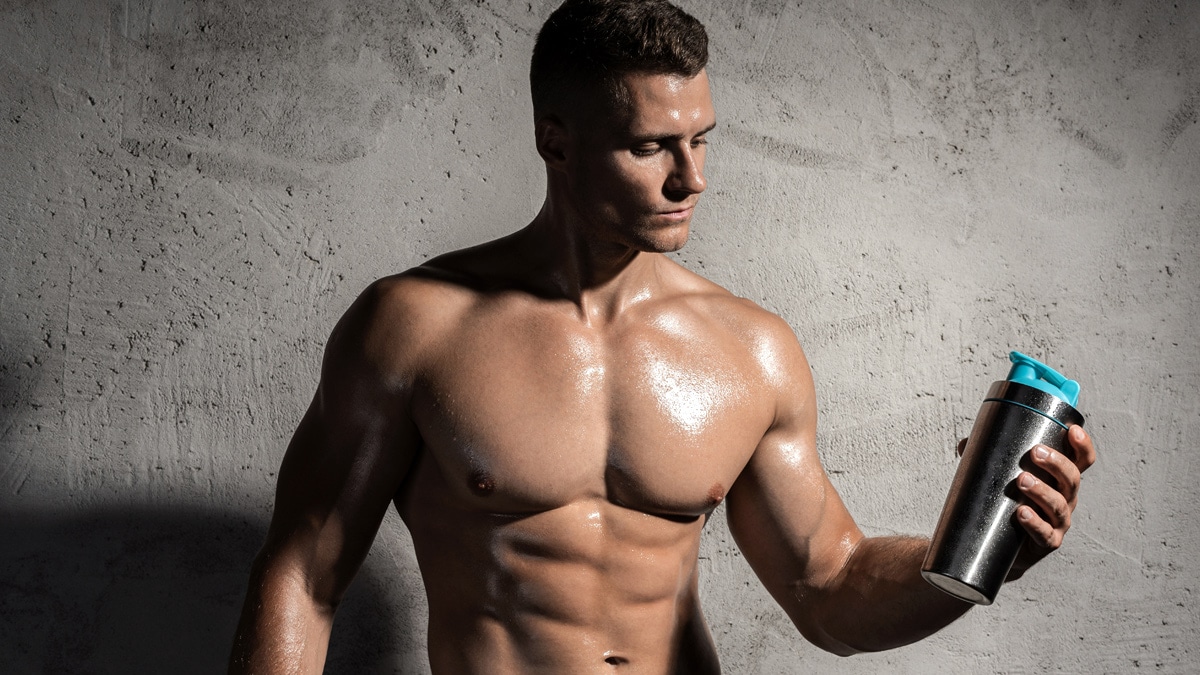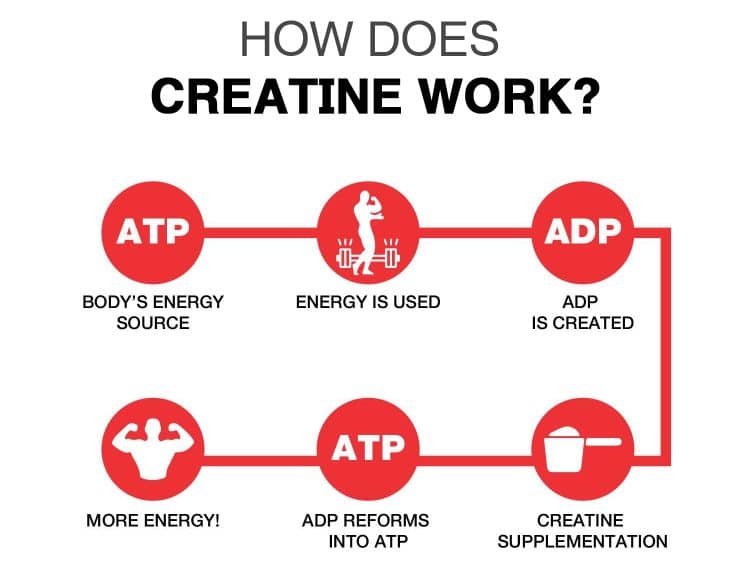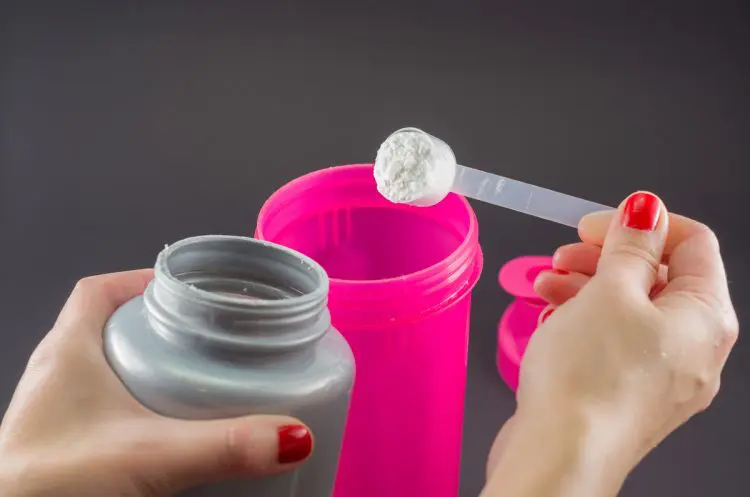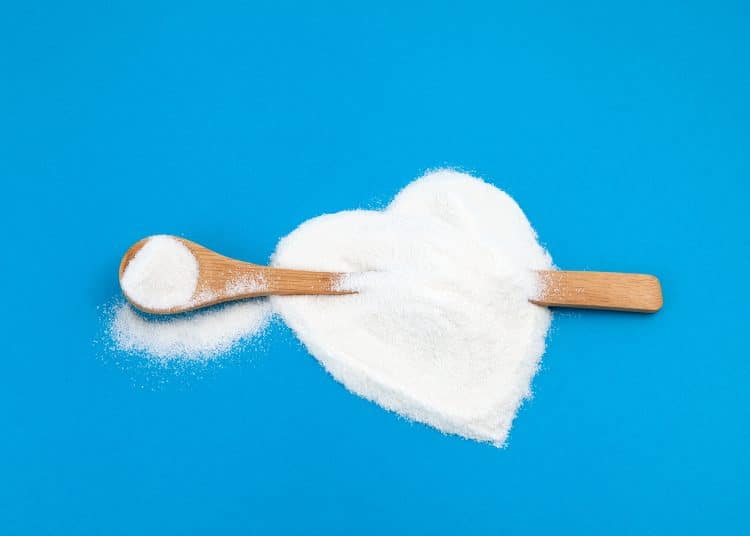Creatine holds a significant role among fitness enthusiasts. As one of the most studied and debated supplements, its benefits in muscle growth and energy elevation when combined with resistance training are evident. (1)
But the question arises: how much water should you drink when taking creatine? For optimal results, it’s advised to mix 3-5 grams of creatine with 8 ounces of water, ensuring more effective absorption. Moreover, maintaining hydration with about a gallon (3-4 liters) of water daily is crucial when using creatine. Dive in as we explore the relationship between water and creatine, the significance of hydration, and pointers for choosing the right creatine supplement for you.
How Does Creatine Work?
You need to understand how creatine works inside your body if you want to make the most of it in your training.
Creatine is an organic acid present in all vertebrates and occurs naturally in your body. It is synthesized from the three amino acids — L-arginine, L-glycine, and L-methionine in your pancreas and stored primarily in your skeletal muscles.
Around 95% of creatine in the human body is stored in skeletal muscle, and 5 percent is in the brain. Between 1.5-2% of the body’s creatine store is converted for use each day by the liver, kidneys, and pancreas.
Creatine helps produce rapid bursts of energy. These can help in physically intensive activities like plyometrics, high-intensity interval training, and weight lifting.
Here is how creatine improves your performance:
- Your body oxidizes carbs, protein, or fat to produce adenosine tri-phosphate (ATP).
- ATP is your body’s energy source. It is responsible for powering your body’s daily functioning. On top of that, ATP even plays a role in creating more ATP.
- When a phosphate group is hydrolyzed, energy in the form of heat is given off to drive a process, for example, muscle contraction during training.
- Because one phosphate has been lost from the ATP, it is now called ADP (adenosine di-phosphate).
- Now you have free ADP as a product from the ATP hydrolysis. However, ADP is useless in the body unless it is converted back into ATP.
- This is where creatine shines.
- Creatine works by donating its phosphate group to the ADP to re-form ATP.
- More energy is produced, and the circle repeats itself continuously.
Now that we have discussed how creatine helps improve your physical performance, here is how it aids in building muscle mass:
- Draws water into muscles.
- Grows muscle fibers.
- Slows muscle breakdown.
Benefits of Creatine
The main benefits of supplementing with creatine include:
- Creatine can boost the formation of proteins that create new muscle fibers.
- It can increase the water content of your muscles — a process known as cell volume action that can result in a quick increase in muscle size.
- Creatine can help improve brain function.
- Research suggests that creatine might help with Parkinson’s disease. (3)
- May lower blood sugar levels and fight diabetes.
- Helps muscle cells produce more energy that allows your body to produce more ATP energy to fuel your muscles during HIIT.
- Reduces fatigue and tiredness.
- Finally, creatine is one of the most well-researched and safe sports supplements.
Common Myths About Creatine
Here are some of the most common misconceptions about creatine:
1. It is Only Effective at Improving Athletic Performance
Most people make the mistake of labeling creating an exercise performance supplement. However, it is increasingly being utilized by recreational weight trainers as an aid to increase lean body mass.
2. You Need To Drink a Boatload of Water While Using Creatine
Brofessors at your gym might tell you that using creatine can make you look soft and puffy.
Creatine supplementation has often been associated with the concern that it can promote dehydration as it facilitates greater fluid uptake into muscle cells.
While there is no scientific proof that creatine causes dehydration, research suggests that using creatine can help with hydration. (2)
3. Creatine Causes Increase in Body Fat
Since creatine consumption usually results in a quick weight gain during the initial stages of supplementation, most people mistakenly consider it a fat buildup. However, the weight gain is due to creatine pulling water into your cells from the bloodstream and not an increase in body fat percentage.
4. Causes Kidney Problems
This is one of the oldest creatine myths that refuses to die down. Both short and long-term creatine supplementation (in a range of dosages) has no effect on serum creatinine levels, which is a marker of kidney function and damage.
Related: Creatine vs. Pre-Workout: What Are They and Which is Right for Me?
Should You Drink More Water While Taking Creatine?
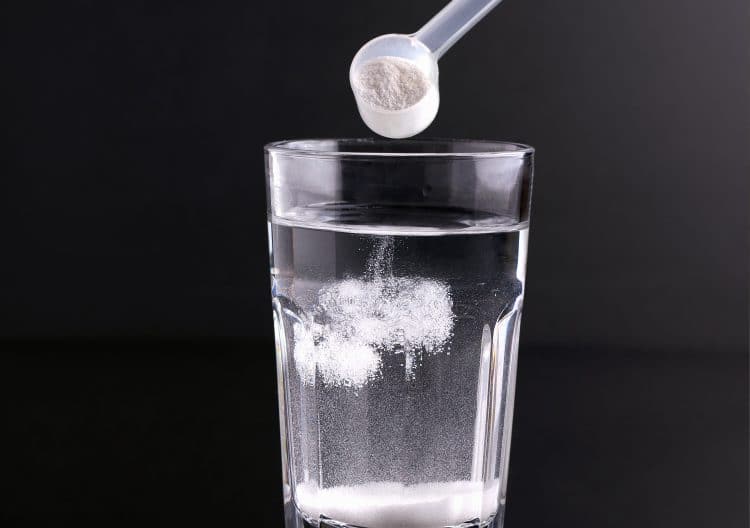
Contrary to popular opinion, you do not need to drink more water when taking creatine. However, if you work out regularly or are into sports, you should drink more water than a regular person to ensure proper hydration.
Drinking a gallon of water every day ensures that the water you lose from sweating while engaging in physically intensive activities is replaced, and you do not dehydrate. It is especially important if you live in a dry and humid environment.
Check Out: Creatine Calculator: Find Your Daily Creatine Intake
Side Effects of Dehydration
In adult men, about 60% of their bodies are made up of water — 55% for adult women. Water plays a vital role in our bodies. Staying hydrated helps protect body organs and tissues, carries nutrients and oxygen to cells, lubricates joints, lessens the burden on our kidneys and liver.
Drinking enough water is vital for the proper functioning of your body. Dehydration can hamper your daily functioning and impact your exercise performance.
If you are facing any of these issues, you should try bumping up your daily water intake:
- A dry mouth throughout the day
- Recurring headaches
- Dry skin, lips, and eyes
- Increased thirst
- Constant fatigue
- Feeling dizzy or lightheaded
- Stomach discomfort
- Muscle cramps
Ways of Consuming Creatine
There are a couple of different ways pros consume creatine.
- Mixing with Water: Mix 3-5 grams of creatine with 8 oz of water using a spoon or a shaker bottle until it’s dissolved.
- Direct in the Mouth: Some people put a scoop of creatine in their mouth, and down it with a glass of water. This method ensures that no residue remains in the glass or shaker bottle.
Tips:
- Use creatine monohydrate in micronized form as it’s smaller than normal creatine and will mix better with water.
- Creatine dissolves better in warm water as compared to cold.
- Do not pre-mix your creatine powder as it starts to degrade the moment it comes in contact with water.
Must Read: Creatine Monohydrate Vs. HCL: What’s the Difference?
Caffeine and Creatine
Caffeine is known to be a diuretic — especially in high doses. (4) Consuming too much caffeine may cause the need to urinate more than you normally do, which can add to the risk of dehydration while supplementing with creatine.
Additionally, a study conducted on 54 male subjects concluded that combining caffeine and creatine can cause stomach aches. (5) Notably, there was no recorded impact of combining caffeine and creatine on the subjects’ exercise performance.
Alchohol and Creatine
Since we have covered caffeine’s impact on creatine, we must talk about another highly popular beverage — alcohol.
Drinking alcohol reduces creatine’s muscle building and endurance and recovery benefits because of three main reasons, including:
1. Alcohol takes away water: Alcohol is one of the most potent diuretics and can pull water away from the tissues, causing dehydration, muscle cramping, and pain — especially in athletes.
2. It causes a lack of water for creatine to do its magic: Creatine pulls water into your cells to build muscle after exercise. If you are dehydrated after a night out with friends, creatine cannot carry out its duties.
3. Alcohol directly impacts creatine-making body organs: Regular drinking can negatively impact your muscles, liver, and kidneys. Since creatine is made and used by these organs, excessive alcohol can slowly weaken your body.
In short, if your goal is to build muscle mass — creatine or not — you should stay away from alcohol.
Must Read: How To Drink Alcohol Without Losing Muscle and Gaining Fat
How Much Water Should You Drink With Creatine?
Research suggests that creatine works like a sponge in your body — meaning it sucks water into and around the cells. (6) Although the water is still in your body, creatine draws water from your blood, causing the same effects as dehydration.
You could experience dehydration symptoms if you don’t adjust your water intake to your creatine supplementation.
Here is the ideal water intake goal while taking creatine:
- Per Serving: Whichever consumption method you use — mixing in a glass or straight in the mouth — you should drink 300-500 ml of water along with a 3-5 gram serving of creatine.
- Full-Day: You should drink at least 4-5 liters of water daily while using creatine to avoid dehydration. However, if you go over the 5 gram mark, you should drink an additional 100 ml of water for every 1 gram of creatine. If you feel indigestion or bloating issues, try mixing it with hot water or beverage.
Pro tip: If drinking water feels like a chore, you could add milk and juices to the mix. Both beverages contain around 80-90% water and can add variety to your day.
Next Read: 12 Best Creatine Supplements of 2024 Reviewed & Ranked
Overdoing Water Intake
Some people recommend drinking up to 2-3 gallons of water every day while supplementing with creatine. However, there is no scientific data to back these numbers.
Drinking such high quantities of water can be potentially harmful. Overconsumption of water tends to over-dilute sodium levels in your bloodstream. Low blood sodium levels can lead to muscle cramps, delirium, coma, and worse, death.
The Optimal Creatine Dosage
Now that you know how much water you should be drinking while supplementing with creatine, let’s talk about the optimal dosage to improve your performance in the gym.
There are two popular ways of creatine dosing:
1. Loading & Maintenance Phases
It is the most common way people take this supplement. The “loading phase” is designed to fully saturate the muscle’s creatine stores.
A typical loading protocol consists of consuming high doses of creatine, like 20-25 grams per day, split between 4-5 daily doses, for 5-7 days.
After completing the loading protocol, athletes can maintain stores with a daily maintenance dose of 3-5 grams per day.
2. Low-Dose Daily Supplementation
The other — and easier — method is to simply take 3-5 grams of creatine every day. In about three weeks, this approach will get your muscular levels to the same point as the loading protocol.
It is not uncommon for people to add 4-7 pounds of weight in the first few days of using creatine. The weight and muscle gain are largely due to the water being pulled from your bloodstream into your muscles.
Learn more about Creatine:
- The 5 Supplements Worth Taking (And Another Five That Aren't)
- Creatine Before and After: How Creatine Supplement Affects Your Body
- I’m a Supplement Researcher — These 3 Creatine Forms Will Supercharge Your Gains (and One’s a Total Rip-Off)
- Creatine and Acne: Are You Making This Common Mistake?
- STOP Wasting Your Creatine! The Ultimate Guide to Proper Usage
- How Long Does Creatine Stay in Your System? A Doctor Explains
- What Happens To Your Body When You Take Creatine Every Day For Muscle Gain?
- Creatine + Whey Synergy: The Science Behind This Power Duo's Muscle-Building Magic
Wrapping Up
While dehydration is a serious issue, there is no scientific evidence to prove — or deny — that supplementing with creatine can lead to the state.
To reiterate, you should drink at least 4-5 liters of water a day while using creatine and 8 oz of water immediately after consuming a dose.
However, if you feel dehydrated anytime throughout the day — especially after an intense workout, feel free to go past the five-liter goal.
References
Fitness Volt is committed to providing our readers with science-based information. We use only credible and peer-reviewed sources to support the information we share in our articles.
- Ewa Jówko, Piotr Ostaszewski, Michal Jank, Jaroslaw Sacharuk, Agnieszka Zieniewicz, Jacek Wilczak, Steve Nissen. Creatine and β-hydroxy-β-methylbutyrate (HMB) additively increase lean body mass and muscle strength during a weight-training program. Volume 17, Issues 7–8, July–August 2001, Pages 558-566
- Michael Greenwood, Richard B Kreider, Charlie Melton, Christopher Rasmussen, Stacy Lancaster, Edward Cantler, Purvis Milnor, Anthony Almada. Creatine supplementation during college football training does not increase the incidence of cramping or injury. Mol Cell Biochem. 2003 Feb;244(1-2):83-8.
- R T Matthews, R J Ferrante, P Klivenyi, L Yang, A M Klein, G Mueller, R Kaddurah-Daouk, M F Beal. Creatine and cyclocreatine attenuate MPTP neurotoxicity. 1999 May;157(1):142-9. doi: 10.1006/exnr.1999.7049.
- Supatra Lohsiriwat, Muthita Hirunsai, Bansithi Chaiyaprasithi. Effect of caffeine on bladder function in patients with overactive bladder symptoms. 2011 Jan;3(1):14-8. doi: 10.4103/0974-7796.75862.
- Trexler ET, Smith-Ryan AE, Roelofs EJ, Hirsch KR, Persky AM, Mock MG. Effects of Coffee and Caffeine Anhydrous Intake During Creatine Loading. J Strength Cond Res. (2016, May)
- Powers ME, Arnold BL, Weltman AL, Perrin DH, Mistry D, Kahler DM, Kraemer W, Volek J. Creatine Supplementation Increases Total Body Water Without Altering Fluid Distribution. J Athl Train. (2003, Mar)
Tip: If you're signed in to Google, tap Follow.


